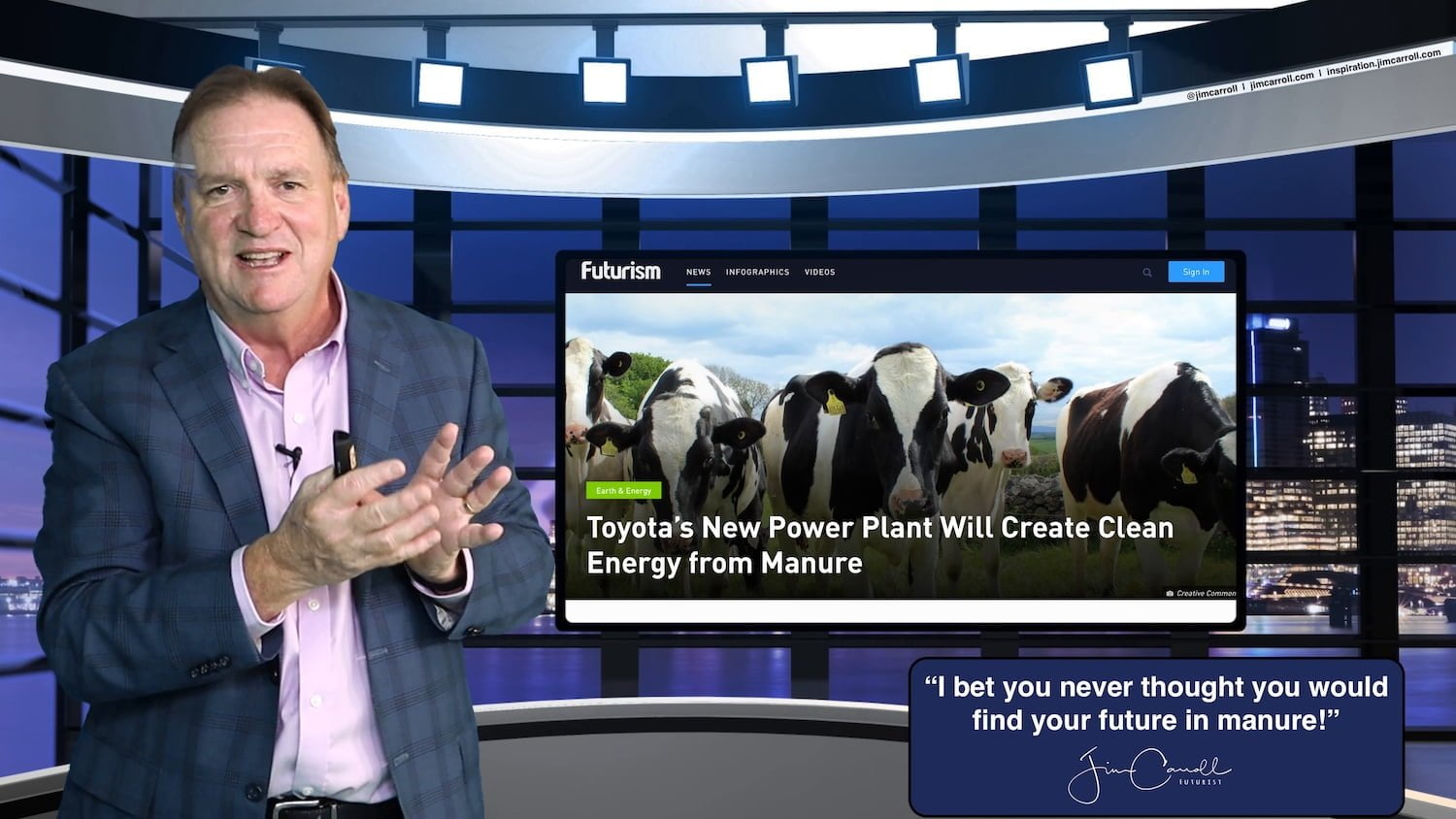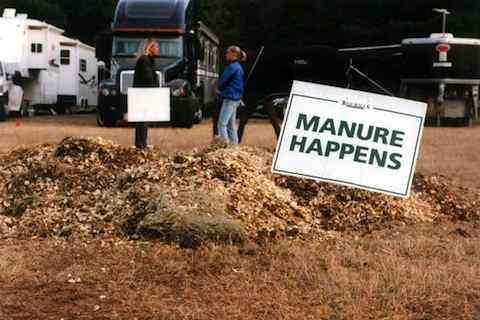“I bet you never thought you would find your future in manure!” – Futurist Jim Carroll

I filmed a virtual keynote yesterday on the future of energy for a client who had to suddenly shift in direction. I don’t mind saying – it’s a 25-minute tour-de-force, and I will share it here later in November. In one section, I covered 20 key energy trends defining our future – and had this one in the section of ‘previously offbeat ideas going mainstream.’ The business of turning manure waste into energy – biofuel – is gaining more momentum with significant corporate initiatives. And the fact is, I predicted this (and other related trends) almost 20 years ago.
You won’t get crappy insight from me! I give you the real stinky deal at times!
What’s it all about? Manure – it’s one of the most significant opportunities of our time, and if you understand what is happening with this crap, you’ll truly understand what comes next. The backstory? Way back in 2003, while I was doing my research for an upcoming agricultural conference I noticed a pretty significant increase in referrals to bio-generation based on manure. Intrigued, I dug into the pile of insight and managed to dig out some small but significant clumps of insight. My message on stage became focused on this message:
“Believe it or not, manure can teach us a great deal about the future of business.”
And from that moment, manure became a bit of a focus of my work. Kind of shitty work, perhaps, but someone has to do it! All kidding aside, the science and fast trends behind the issue really became something fascinating – within a few weeks, my monthly Profit magazine article was focused on the theme – “I Saw the Future in Manure!’. The article is printed in full below. Not only that, but the trends within the substance topic found their way on stage as I explained the evolution of skills, the need for corporate partnerships, fast science, and more.
All this because of the signs I saw happening with what most people thought was a waste problem. Because for me, every problem is an opportunity.
Dig deeper again – did you know there is an entire profession of people known as Manure Managers? They assist farmers in turning a challenge into an opportunity. Dig into their world, and you’ll discover skills partnership really define our future. They even have their own magazine! You’ll find it, of course, over at ManureManager.com
Manure? I’m on a roll here! The subject actually became the title for many a keynote from around 2005 to 2007 (before the global economic meltdown changed my focus). One tech conference in 2005 featured me in the program with this keynote topic: “I Found the Future in Manure: How to Capitalize on the Rapid Evolution of Science.” Here’s the description for my talk:
“In the last decade, the world has seen the emergence of a globally connected scientific mind. The impact is dramatic — while there are 19 million known chemical substances today, it is estimated that by 2025 there will be some 300 million — and 5 billion by 2100. As Apple learned with the iPod, the discovery of a single new chemical substance can lead to the emergence of a billion dollar market, literally overnight. Since science is at the heart of every industry — and with such rates of discovery, innovation abounds. Join leading international futurist, trends and innovation expert Jim Carroll as he explores the impact of hyper-science, and what it means in terms of bio-tech, nanotech and everything-tech. What does this have to do with manure? Join Jim and find out!
In that talk, I explained the relationship between manure, a ’57 Chevy, and transportation in the year 2016. Seriously. I’ll save that for another day.
The topic spin certainly caught the attention of those with a focus on skills and corporate partnership. Consider this in a posting over at KnowledgeWorks, an education site:
“How do you think about careers and skills in time of rapid change?” This was the question Jim Carroll asked attendees of the KnowldgeWorks Experience Conference.
Robotic therapeutical therapy monitors. Water footprint analysts. Manure managers. These are just some of the real jobs Carroll gave as examples of jobs that didn’t exist ten years ago. This presents a challenge to companies who are having to partner with technology companies and bring in skills they didn’t have before. For those of us in education, the challenge is equally as great. We need to prepare kids for a rapidly changing world.
“The future belongs to those are fast,” said Carroll. He wasn’t talking about physical speed but the speed at which people can adapt to change. This is important to those of us education the next-generation workforce. In education we have no choice but to be looking to the future.
And so now you’ve learned a lot about manure – and how what is often perceived as a problem is actually an opportunity.
But wait, there’s more! To really understand, go back to my original column in Profit from 2004.
I saw the future in manure!
Believe it or not, manure can teach us a great deal about the future of business
Profit Magazine
December 2004
This past summer, I was invited to speak at a western agricultural company’s annual golf day. In attendance were several hundred farmers, their families, and various folks from the local area, in a small town about 100 miles from the nearest city. It was about as rural as you could get.
I was asked to address “what comes next” in the world of agriculture, so I looked into the unique challenges facing agriculture today, as well as the trends that will impact the industry over the next five to twenty years.

While doing my research, I came across the phrase “manure management.” That was a new one! And the deeper I dug — so to speak — the more I came to realize that, believe it or not, we can learn a great deal about the future by looking at what is going on with manure. These are the lessons I learned from manure:
1. Accept that times are changing: We live in a time when change is taking place faster than ever and is speeding up. The mere fact that there’s a profession of people known as “manure managers” shows we’re entering a world that will be far more complex. Recognizing that fact is step one to succeeding in the future.
2. Science is making waves: Manure managers exist because there’s a lot of innovation and R&D occurring with manure. For example, one of the biggest manure management problems involves what’s known as “pit crust.” As the name suggests, it’s the top layer of the manure in the pit, and it gets rather hard and crusty, leading to flies and rodents, not to mention enhanced smell problems.
Rapid evolution in biogenetics is helping to deal with the problem. Scientists determined that most of the pit crust comes from the outer shell of the corn that is fed to the animals, so they developed a specialized bio-enzyme that breaks down the shell during digestion, leading to a thinner crust. The result: fewer rodents and flies, less potential for disease and a big, positive environmental impact.
That’s but one example of how rapid scientific advance is causing change. Look into any industry, and you can see the emergence of all kinds of rapid innovation and new developments. Expect that trend to become more pronounced and even faster over time.
3. Hyper specialization will soon be standard: Given that there is so much new stuff going on, the typical farmer might not learn of the latest advances in manure management. That’s where the manure manager comes in — individuals who possess the specialized knowledge of what’s out there and what can be done with it. They are partners in the process, helping the farmers cope with the rapid change swirling around them.
A typical farmer can no longer be expected to know everything there is to know about farming today. They must call in outside expertise to help them deal with every type of complex issue, of which manure management is only one. And this is a trend true across the economy.
There is now so much new knowledge emerging that every profession and career is fragmenting into dozens of sub-specialties. No one person can be expected to master everything anymore.
4. A specialized partner can save you money: Manure managers are experts in providing farmers with the opportunity for revenue enhancement through the more intelligent application of manure in the fields. In one area in the U.S. Midwest, experts have been working with local farmers to undertake detailed soil and yield analysis to determine the best application rates for future plantings. The returns have been significant — one family farm saw a $19 increase in revenue yield per acre through such efforts. That might seem like a small number until you multiply it by 2,000 acres, for a net result of $38,000 — a big revenue improvement for a family farm operation.
That’s but one small example of how a specialized partner, dealing with specialized knowledge, can help you with your business. As the body of knowledge that surrounds us grows, there are all kinds of innovative, new, and challenging ways to run the business better.
5. The future will be increasingly complex: Manure provides a useful signpost to a world that is going to involve a lot more change, specialization, and complexity. Everything we know – the jobs in which we work, the professions in which we’ve been trained, the skills we possess, the marketplace in which we sell our products, the industry in which we work and the knowledge that we’re expected to master will be extremely different tomorrow.
The fact that there exists in the world a group of people who are proud to be recognized as manure managers tell us a lot about the complexity of our future. Figuring out how to deal with such complexities will become the essence of innovative thinking, and from that, our future success.





GET IN TOUCH
Jim's Facebook page
You'll find Jim's latest videos on Youtube
Mastodon. What's on Jim's mind? Check his feed!
LinkedIn - reach out to Jim for a professional connection!
Flickr! Get inspired! A massive archive of all of Jim's daily inspirational quotes!
Instagram - the home for Jim's motivational mind!